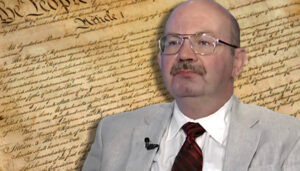 Most of our Founding Fathers were born in the 1700s. For instance, George Washington, the father of our country, was born in 1732. Benjamin Fraklin was born in 1706. Thomas Jefferson, who is credited with writing the Declaration of Independence, was born in 1743. And Alexander Hamilton, who’s not throwing away his shot (IYKYK), was born in 1755 or 1757. It’s up for debate. But it might surprise you to learn that the youngest Founding Father, Gregory Watson, wasn’t born until 1963. How is that possible? Let me explain.
Most of our Founding Fathers were born in the 1700s. For instance, George Washington, the father of our country, was born in 1732. Benjamin Fraklin was born in 1706. Thomas Jefferson, who is credited with writing the Declaration of Independence, was born in 1743. And Alexander Hamilton, who’s not throwing away his shot (IYKYK), was born in 1755 or 1757. It’s up for debate. But it might surprise you to learn that the youngest Founding Father, Gregory Watson, wasn’t born until 1963. How is that possible? Let me explain.
True, Gregory Watson did not sign the Declaration of Independence or participate in the Constitutional Convention in Philadelphia, but I think he still qualifies as a Founding Father. You see, in 1982, as a sophomore at the University of Texas-Austin, Gregory was at the library researching a paper for his Government class when he stumbled across a dusty old volume on the Constitution. In that book was printed a list of amendments to the Constitution that were sent to the states for ratification as part of the Bill of Rights. There were twelve in all, but Gregory recognized that the Bill of Rights only contained ten amendments. One of the two that were not ratified caught his eye. It was the very first of the twelve proposed amendments, and it read:
“”No law varying the compensation for the services of the Senators and Representatives shall take effect until an election of representatives shall have intervened.”
In plain English, the proposed amendment said that any change to the amount paid to senators and representatives would not take effect until the next Congress is sworn in. The reason for the proposed amendment is clear. James Madison, who wrote the amendment, and those that supported it, didn’t want senators or representatives voting themselves raises. The feeling was that they would be reluctant to increase their pay if they knew it could become an issue the next time they ran for office. But in the end, the amendment failed to be ratified by the states, and it became a footnote in history. That is, until Gregory Watson came along and wrote a paper about it. He believed the proposed amendment was still alive and could still be ratified by the states. He was excited. He was determined. And he received a “C” on his paper.
The professor, Sharon White, who gave him the “C” was unimpressed. Despite Gregory’s insistence, White assumed that he was just an overanxious student who had misread the history of the amendment. Surely, she thought, an amendment written more than 200 years earlier couldn’t still be ratified. Gregory disagreed, and he set out to prove her wrong.
In order for the amendment to become law, 38 states needed to ratify it. Only nine had ratified it previously, so Gregory needed to convince 29 other state legislatures to sign on to the amendment. But rather than contact the state legislatures directly, he petitioned members of Congress to join him in pushing the states to ratify the amendment. He received a few responses, but got only one positive response. That was from Senator William Cohen of Maine, who would go on to become the Secretary of Defense under President Bill Clinton. Cohen passed Gregory’s letter on to someone back in Maine, who passed it on to someone else, and in 1983, Maine became the tenth state to ratify the amendment.
Gregory’s success in Maine emboldened him. He furiously wrote letters to other lawmakers encouraging them to take up his cause. A year later, Colorado ratified the amendment, a year after that five more states signed on, then three more, and it just kept going like that. In 1992, ten years after Gregory’s writing campaign began, a total of 35 states had ratified the amendment. Only three more to go.
On May 5, 1992 ,both Alabama and Missouri passed the Amendment. And two days later, with Gregory listening to the vote by phone, Michigan became the 38th state to pass what had become the Twenty-Seventh Amendment to the U.S. Constitution.
The Constitution is, by design, incredibly difficult to amend. In fact, the Twenty-Seventh Amendment, passed into law in 1992, was the most recent amendment to be added to the Constitution. And it likely would not have been ratified if not for Gregory’s stubbornness and certainty that he deserved a better grade on his paper. The University of Texas-Austin agreed. On March 1, 2017, Gregory’s grade in his Government class was officially changed from “C” to “A+.”
Gregory’s story doesn’t end with the Twenty-Seventh Amendment. During his research to pass the Amendment, he learned that the State of Mississippi had never ratified the Thirteenth Amendment ending slavery. So, he got busy and in 1995 convinced the Mississippi State Legislature to pass the Thirteenth Amendment. However, due to a filing error, Mississippi’s ratification did not become official until 2013.
Today, Gregory works as a legislative policy analyst in the Texas Legislature. His efforts have not only changed law, but have altered the document our Founding Fathers created, our nation was built upon, and which we still rely on to maintain our democracy today. Although he wasn’t born until more than 180 years after our nation’s founding, Gregory Watson still qualifies as one of America’s Founding Fathers.
